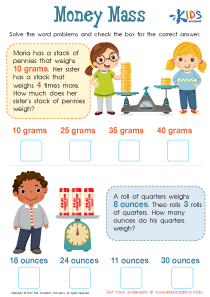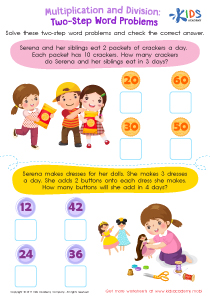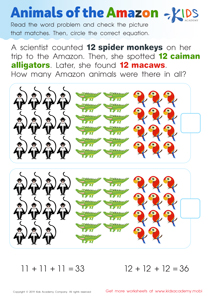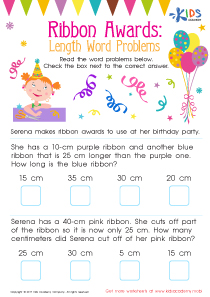Extra Challenge Money Word Problems Worksheets for Ages 3-4
1 filtered results
-
From - To
Introduce your little ones to the exciting world of math with our Extra Challenge Money Word Problems worksheets, tailored specifically for children aged 3-4 years. These engaging homeschool online printables are designed to spark curiosity and develop early numeracy skills through fun and interactive money-related challenges. Perfect for young learners, these worksheets offer a gentle introduction to concepts of buying and spending, using simple, relatable scenarios. With our printables, watch your preschoolers enjoy mastering new skills right from the comfort of your home. Start your child's journey towards becoming a math whiz today!
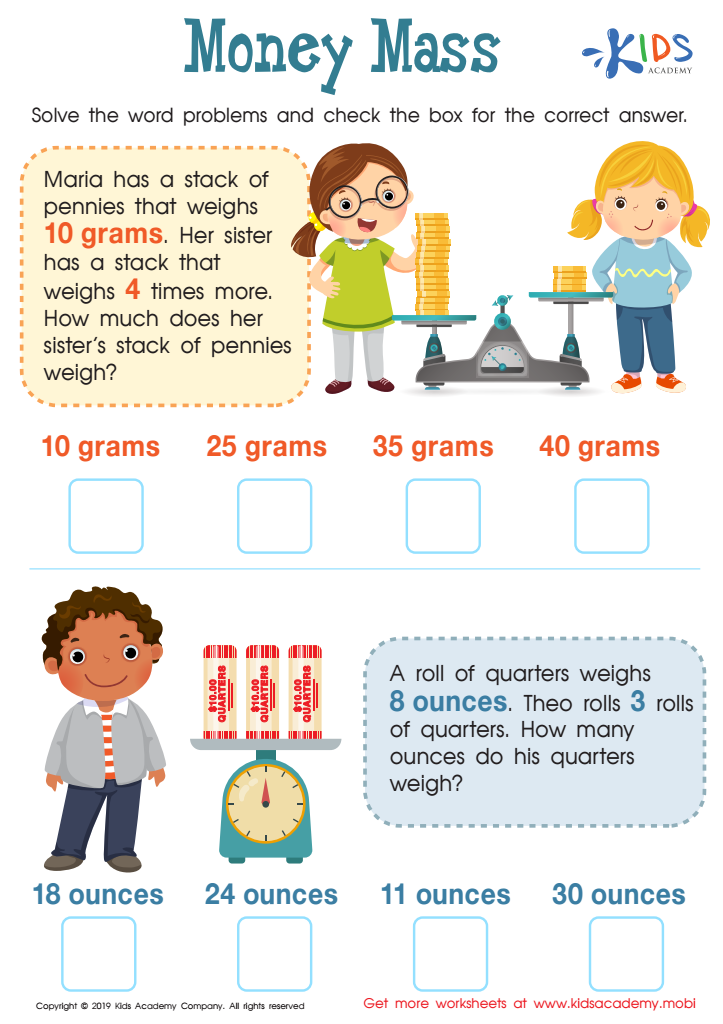

Money Mass Worksheet
Unlocking Early Financial Literacy: The Power of Extra Challenge Worksheets on Money Word Problems for Preschoolers
In the dynamic world of early childhood education, interactive learning tools stand out as essential elements in fostering young minds. Particularly for homeschooled children aged 3-4 years, incorporating engaging and educational resources can make a significant difference in their developmental journey. This is where "Extra Challenge Worksheets on Money Word Problems" come into play, offering a unique educational experience tailored to young learners. These homeschool interactive worksheets are not just another set of papers; they are a gateway to understanding basic financial concepts through a fun and engaging approach.
Why Focus on Money Word Problems at Such an Early Age?
Introducing preschoolers to money management through word problems might seem premature at first glance. However, early exposure to simple monetary concepts can set the foundation for more complex financial literacy skills as children grow. By tackling money word problems, children can begin to understand the value of money, basic addition and subtraction, and the importance of saving and spending wisely, albeit at a very fundamental level.
Advantages of Extra Challenge Worksheets on Money Word Problems
-
Development of Cognitive Skills: These worksheets are designed to challenge young minds just enough to spark interest and learning. Solving money word problems enhances critical thinking and problem-solving skills, as children figure out answers using logical reasoning.
-
Numeracy Skills Enhancement: Early math skills are crucial, and through engaging with money-based scenarios, children can develop a stronger grasp of numbers and arithmetic operations. This not only aids in their current learning but sets a robust base for future mathematical endeavors.
-
Real-World Application: Money is a tangible part of everyday life. By using homeschool interactive worksheets focused on money word problems, children can begin to make connections between their lessons and real-world situations. This context helps in retaining new information more effectively.
-
Interactive Learning: Unlike traditional rote learning methods, these worksheets encourage interaction and discussion. Parents and educators can facilitate learning by discussing the problems, thus making the learning session interactive and more effective. This approach also helps in bonding with the child, as they navigate through the challenges together.
-
Customizable Difficulty Levels: The "Extra Challenge" aspect means that these worksheets are designed to cater to varying levels of difficulty, suitable for the learning pace of each child. Parents can choose worksheets that align with their child's current understanding and gradually introduce more complex problems as their skills improve.
-
** Enhanced Engagement: The design of these worksheets often includes colorful illustrations and themes that are attractive to preschoolers. Such visuals not only capture the child's attention but also make the process of learning about money enjoyable and less intimidating. Engaging young children with appealing materials encourages them to return to these exercises eagerly, fostering a positive attitude towards learning.
Building a Foundation for Future Financial Awareness
Starting financial education early with tools like Extra Challenge Worksheets on Money Word Problems lays a foundation for more detailed financial knowledge and responsible money management in the future. As children grow, they will encounter more complex financial decisions and systems. Early lessons that introduce basic concepts of earning, spending, saving, and investing, albeit in a simplified form, prepare them for later life challenges and opportunities.
Ideal for Homeschool Settings
For homeschooling parents, finding the right materials that resonate with and effectively teach young children can be challenging. The flexibility and interactive nature of these worksheets make them an ideal choice. They allow parents to tailor lessons based on their child’s interests and pace of learning, providing a personalized educational experience that might be harder to achieve in more structured educational settings.
Conclusion
The importance of integrating financial literacy into early childhood education cannot be overstated, and the Extra Challenge Worksheets on Money Word Problems are a fantastic tool in this regard. They offer a blend of cognitive, mathematical, and life skills development that can significantly benefit preschool-aged children. By incorporating these homeschool interactive worksheets into their curriculum, parents can ensure that their children are not only prepared for academic success but also equipped with the practical knowledge needed to navigate the financial aspects of life with confidence.
 Assign to My Students
Assign to My Students







